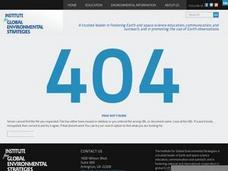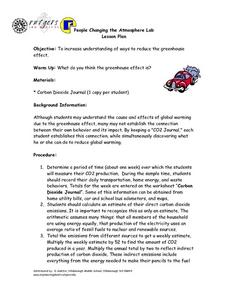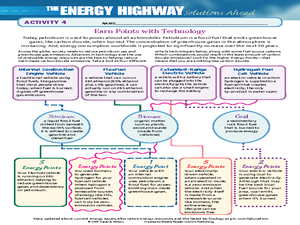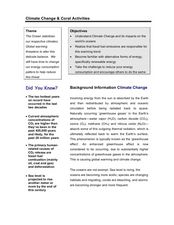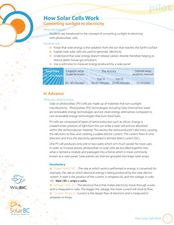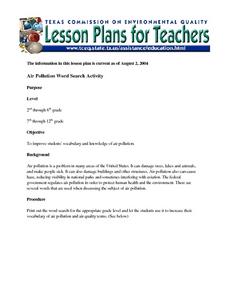Curated OER
CO2 and You
Students study the scientific evidence about carbon dioxide emissions. They learn to calculate the amount of energy used by different appliances. They complete a worksheet which analyzes the amount of energy that their home uses.
National Park Service
What Can We Do?
Motivate young conservationists to stand up and make a change. After learning about the efforts in Cascade Nation Park to reduce carbon emissions in order to preserve the wilderness, students work in groups creating action plans for...
Curated OER
The Cricket and The Plant
Students examine determine the symbiotic relationship between plants and animals as the find ways to naturally reduce carbon dioxide emissions. They study the carbon cycle. They work with probe and graphing calculator to examine the...
Curated OER
Carbon Footprint Estimator
Young scholars discover what a Carbon Footprint represents. For this sustainable lifestyle lesson, students determine their Carbon Footprint as an individual and as a class. Young scholars use a the Internet to calculate how many earths...
Curated OER
Global Warming
Students examine how human produced emissions of carbon dioxide contribute to global warming. Using the internet, they research the future effects of global warming on the Earth. In groups, they discover ways to reduce daily energy...
Montana State University
Climb into Action!
Climate change affects even the largest and intimidating of landforms—even Mount Everest! A resource helps teach learners the connection between global climate change and its effects on Earth. Activities include videos, class discussion,...
Curated OER
Tread Lightly: Low Carbon Lunch
Young scholars create a flowchart of the carbon footprint of food from production to disposal. In this biology activity, students brainstorm ways to reduce greenhouse gases by smart food choices. They create a blog promoting ways to eat...
Curated OER
People Changing the Atmosphere Lab
Students examine ways to reduce the greenhouse effect. Students keep a "CO2 Journal" to help establish a connection between their own behavior and its impact on global warming as well as discover ways to reduce global warming.
Curated OER
Earn Points with Technology
Students explore renewable energy by analyzing a diagram. In this fossil fuel activity, students view a chart explaining the different energy consumption from automobiles and how they impact our environment. Students analyze a point...
Curated OER
Permit Trading
Emerging environmentalists work in groups and pretend that each is a power company generating electricity for a community. They consider the costs of building a renewable electricity generator that will increasingly replace generating...
Curated OER
The Air We Breathe
Students discover the cuases of pollution. They investigate different pollutants that exist. Stsudents research technologies developed by engineers to reduce the amounts of air pollution. Upon completion of assigned activities,...
Curated OER
Climate Change & Coral Activities
Learners study how the ocean stabilizes our planet's climates and how global warming is becoming a threat to this fine balance. In this climate change lesson, students identify that fossil fuel emissions are responsible for global...
Curated OER
How Much Energy Do You Use?
Students take a survey of energy-consuming appliances in their homes and calculate the daily cost of operating these machines. They identify those appliances that consume the most energy and consider ways to reduce the amount of energy...
Curated OER
Calculating Your Travel GHGs
Students calculate the amount of greenhouse gases they produce in a given day. Using an equation, they determine the emissions for different sized vehicles and calculate the amount resulting from a family vacation. They create a class...
Curated OER
Auditing the Energy-Guzzlers in Your Home
Students identify the energy sources in their community as renewable or non-renewable resources. Using their homes, they identify the types of energy they use to heat and power it. They calculate the amount of electricity used by each...
Curated OER
The Kyoto Protocol: What Should We Do?
Students examine why the United States did not ratify the Kyoto Protocol. They develop their own opinion on the Protocol and share them with the class. They also discover how scientific data may be organized to use in a debate.
Curated OER
The Wind & Sun: Powerful Alternatives
Students examine the power that is possible from the sun through an interactive program. They also analyze how energy turns into different forms in different parts of the human body. They finally explore how wind is created and how wind...
Curated OER
How Solar Cells Work: Converting Sunlight to Electricity
Students examine how to convert sunlight to electricity. In this renewable energy sources lesson students explain how solar cells are used and use a voltmeter to measure the energy produced by a solar panel.
Curated OER
Air Pollution Word Search Activity
Students examine the issues surrounding air pollution. They discover how it affects peoples health and the government's regulations. They complete a word search activity to practice the vocabulary.
Curated OER
Hot Stuff!
Students observe different demonstrations on the greenhouse effect. They build their own models to show the phenomenon. They discus the role of greenhouse gases on global warming.


